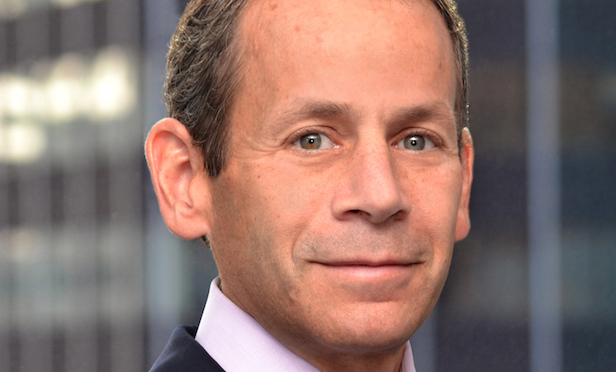
NEW YORK CITY—From the standpoint of borrowers in the $7.5-million to $25-million range, a go-to financing option is conduit debt. It's also a source of “continued frustration,” says Michael Becktel, managing director of Hunt Mortgage Group—the kind of ongoing headaches that led his firm to develop a new proprietary loan product intended to provide an alternative.
Becktel and his Hunt Mortgage Group colleague, managing director Barry Polen, cite a number of factors feeding this frustration. “One is that there's not really certainty of execution, so borrowers get re-traded on spread, often right at the closing table,” Becktel tells GlobeSt.com. “They think their spread is going to be one thing and they find out at the last minute that it's higher.”
Then there's what Polen and Becktel call “B-buyer risk” facing would-be borrowers in conduit deals. “That's a risk that we believe a lot of borrowers for commercial real estate transactions aren't going to be willing to take,” Polen tells GlobeSt.com. “You can get to the closing table to buy a property, you thought you had a loan lined up and all of a sudden you don't have a loan lined up, because there is a third party who needs to opine on the credit and who the borrower didn't even know existed. If the third party comes to a negative view on the credit, then the money you thought you had to buy a property is no longer there and you have a broken sales contract.
Lastly, there's servicing. “The CMBS transaction, after the deal is done, is very often sold away,” Becktel says. “So the borrower loses their point of contact. They may have done the deal with XYZ shop, but if they have an issue with the loan, now they have to call somebody else whom they've never met.”
These frustrations are “exactly what our program was designed to avoid,” says Polen. The program in question is HFX, Hunt Mortgage Group's newly introduced fixed rate loan product. “It gives borrowers a stabilized, long-term, fixed-rate loan product, but it doesn't have any of the issues that they see on the conduit side,” Becktel explains.

“With HFX, we can offer spread lock,” allowing the buyer to lock in spreads for a seven-day period during the loan application process, he adds. “Hunt is the B-piece buyer and Hunt is the servicer for the life of that loan. So if there's an issue or they want to modify something, or if the loan goes into special servicing, they're dealing with us and not somebody that they've never dealt with before.”
The certainty the new program can offer is heightened when, as Polen puts it, “you have a couple more regulatory issues you have to deal with. You have risk retention, which puts new onus and new importance on the B-piece buyer, and you have Reg. AB2, where you're going to have a guy who's signing it on behalf of the issuer who is not necessarily the one making the loan. So you have another level of potential pushback on the credit.” With more scrutiny on securitized loans due to the new regulations, “you have more risk of the loan not funding.”
The initial capital earmarked for the HFX program is $300 million, and Hunt says that as customer demand grows, more money is expected to be allocated to this effort. Hunt Mortgage Group's Proprietary Loan Program, launched in 2014, has quickly expanded to finance most commercial asset classes in addition to multifamily.

Becktel and his Hunt Mortgage Group colleague, managing director Barry Polen, cite a number of factors feeding this frustration. “One is that there's not really certainty of execution, so borrowers get re-traded on spread, often right at the closing table,” Becktel tells GlobeSt.com. “They think their spread is going to be one thing and they find out at the last minute that it's higher.”
Then there's what Polen and Becktel call “B-buyer risk” facing would-be borrowers in conduit deals. “That's a risk that we believe a lot of borrowers for commercial real estate transactions aren't going to be willing to take,” Polen tells GlobeSt.com. “You can get to the closing table to buy a property, you thought you had a loan lined up and all of a sudden you don't have a loan lined up, because there is a third party who needs to opine on the credit and who the borrower didn't even know existed. If the third party comes to a negative view on the credit, then the money you thought you had to buy a property is no longer there and you have a broken sales contract.
Lastly, there's servicing. “The CMBS transaction, after the deal is done, is very often sold away,” Becktel says. “So the borrower loses their point of contact. They may have done the deal with XYZ shop, but if they have an issue with the loan, now they have to call somebody else whom they've never met.”
These frustrations are “exactly what our program was designed to avoid,” says Polen. The program in question is HFX, Hunt Mortgage Group's newly introduced fixed rate loan product. “It gives borrowers a stabilized, long-term, fixed-rate loan product, but it doesn't have any of the issues that they see on the conduit side,” Becktel explains.

“With HFX, we can offer spread lock,” allowing the buyer to lock in spreads for a seven-day period during the loan application process, he adds. “Hunt is the B-piece buyer and Hunt is the servicer for the life of that loan. So if there's an issue or they want to modify something, or if the loan goes into special servicing, they're dealing with us and not somebody that they've never dealt with before.”
The certainty the new program can offer is heightened when, as Polen puts it, “you have a couple more regulatory issues you have to deal with. You have risk retention, which puts new onus and new importance on the B-piece buyer, and you have Reg. AB2, where you're going to have a guy who's signing it on behalf of the issuer who is not necessarily the one making the loan. So you have another level of potential pushback on the credit.” With more scrutiny on securitized loans due to the new regulations, “you have more risk of the loan not funding.”
The initial capital earmarked for the HFX program is $300 million, and Hunt says that as customer demand grows, more money is expected to be allocated to this effort. Hunt Mortgage Group's Proprietary Loan Program, launched in 2014, has quickly expanded to finance most commercial asset classes in addition to multifamily.
© Touchpoint Markets, All Rights Reserved. Request academic re-use from www.copyright.com. All other uses, submit a request to [email protected]. For more inforrmation visit Asset & Logo Licensing.








